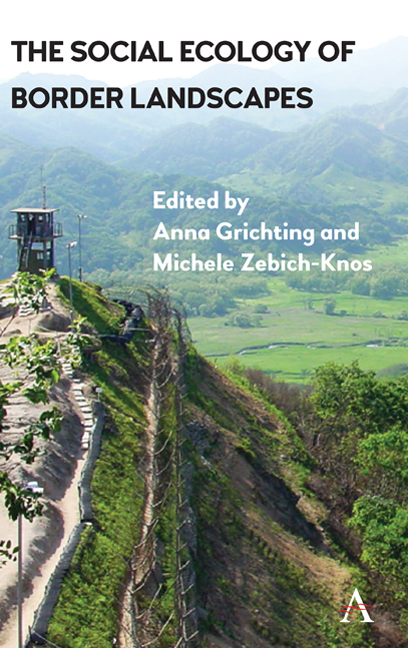Book contents
- Frontmatter
- Contents
- List of Illustrations
- Preface
- List of Contributors
- Introduction: Social Ecologies and Borderlands
- Part I FRAMES: MAPPING SOCIAL ECOLOGIES IN BORDER TERRITORIES
- Chapter One On the Agency of Borderlands
- Chapter Two Social Ecology and Transboundary Conservation: (Re)connecting Nature and People in Borderlands
- Chapter Three Social Ecologies and Structural Violence: Boundary-Making as Nature-Making in a Gated Globe
- Part II BRIDGES: RESILIENCE, RESTORATION AND RECLAMATION
- Part III CORRIDORS: CATALYSTS AND COLLABORATION IN CONFINED SPACES
- Part IV PORTALS: DIALOGUE, EXCEPTION AND RETERRITORIALIZATION
- Conclusion: Making Sense of Social Ecology, Borders and the Environment
- Index
Chapter Three - Social Ecologies and Structural Violence: Boundary-Making as Nature-Making in a Gated Globe
from Part I - FRAMES: MAPPING SOCIAL ECOLOGIES IN BORDER TERRITORIES
Published online by Cambridge University Press: 10 January 2018
- Frontmatter
- Contents
- List of Illustrations
- Preface
- List of Contributors
- Introduction: Social Ecologies and Borderlands
- Part I FRAMES: MAPPING SOCIAL ECOLOGIES IN BORDER TERRITORIES
- Chapter One On the Agency of Borderlands
- Chapter Two Social Ecology and Transboundary Conservation: (Re)connecting Nature and People in Borderlands
- Chapter Three Social Ecologies and Structural Violence: Boundary-Making as Nature-Making in a Gated Globe
- Part II BRIDGES: RESILIENCE, RESTORATION AND RECLAMATION
- Part III CORRIDORS: CATALYSTS AND COLLABORATION IN CONFINED SPACES
- Part IV PORTALS: DIALOGUE, EXCEPTION AND RETERRITORIALIZATION
- Conclusion: Making Sense of Social Ecology, Borders and the Environment
- Index
Summary
Introduction: Boundary-Making as Nature-Making
This chapter builds on the idea that borders, boundaries and boundary-making are central to a social ecology approach — in terms of how we perceive nature, as well as how we understand natural and human-mediated biophysical processes. At a broad level, it could be argued that the Western legacy of compartmentalizing (e.g., bordering) the world into earth, air, fire and water underlies the nature–society binary itself. Yet by insisting that we see nature and society as complexly interrelated, as well as all social and environmental issues as mutually embedded, social ecology challenges this dualistic legacy and invites a profound redrawing of nature–society boundaries. Additionally, social ecology's emphasis on justice, vulnerability, contingency and compassion provides a key — and, we argue, a critical— area of engagement for border studies.
Happily, as this volume attests, the project of redrawing nature–society boundaries appears to be surfacing with some vigor in recent border scholarship, prompting the field to engage more directly with interdisciplinary ways of thinking — especially across some of those tough epistemological divides that are often ignored or discounted when scholars remain firmly siloed within a discipline's parameters. This is particularly true of the border scholarship that is reaching out to ecology as a primary interlocutor. One noteworthy example is the University of Victoria's Borders in Globalization (BIG) project and its adoption of the Stockholm Resilience Center's (SRC) concept of a “planetary boundaries framework” as a guiding principle (i.e., a remapping of the planet in terms of its earth systems). In so doing, BIG interdisciplinary border scholars have adopted a framework in which the traditional geopolitical borders of nation-states are contextualized within large environmental processes. The project now includes research on how atmospheric, terrestrial and aqueous phenomena might be integrated into the study of borders.
Additional conceptual developments within border studies involve engagement with posthuman ecology and its insistence on a relational approach to all beings (human and otherthan-human). This has led, in some cases, to the reconceptualization of border environments and border zones as the “collective performances” of “embodied actors” (including not only security agents and human migrants, but also landscapes and endangered species).
- Type
- Chapter
- Information
- The Social Ecology of Border Landscapes , pp. 53 - 68Publisher: Anthem PressPrint publication year: 2017

